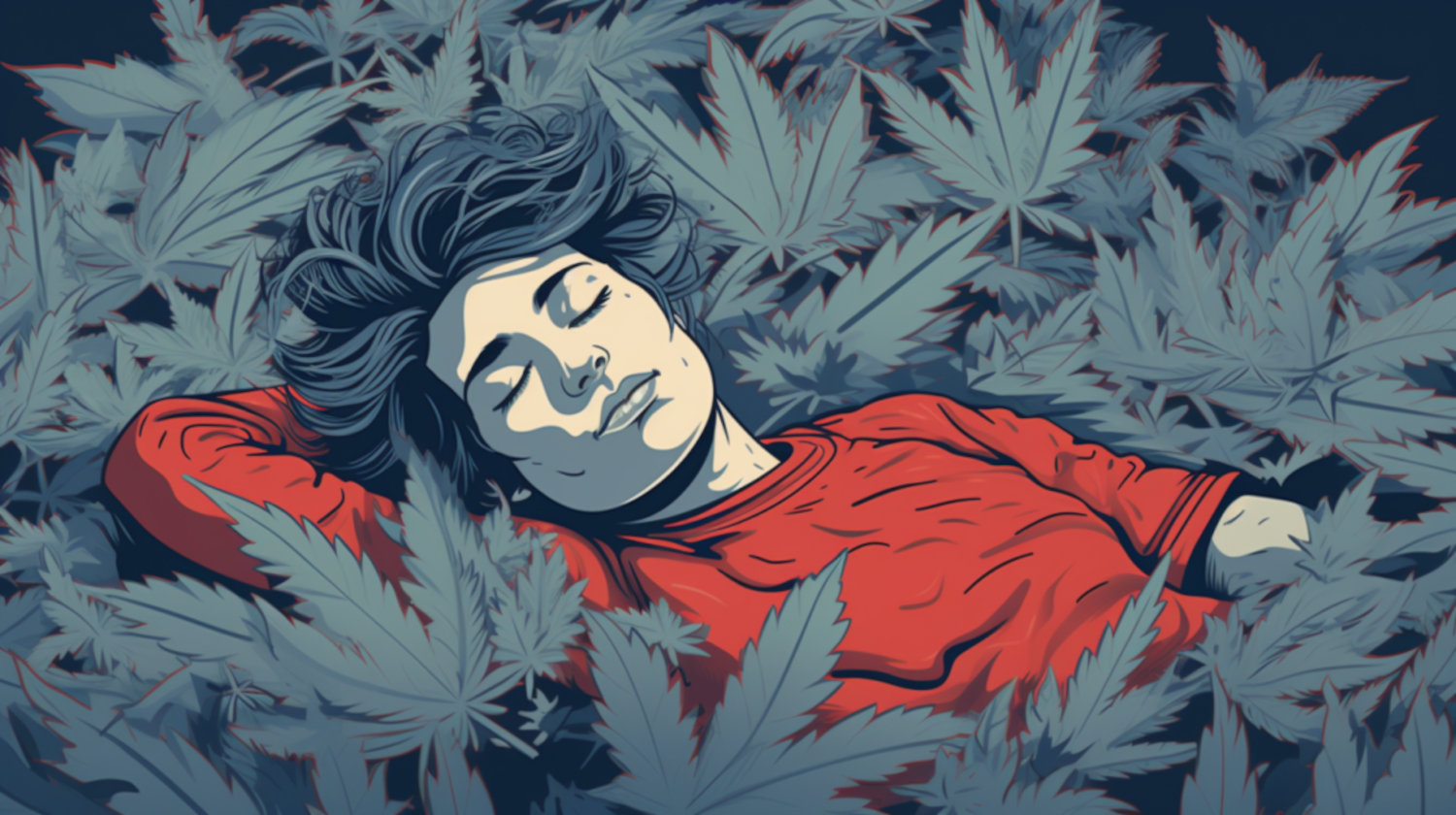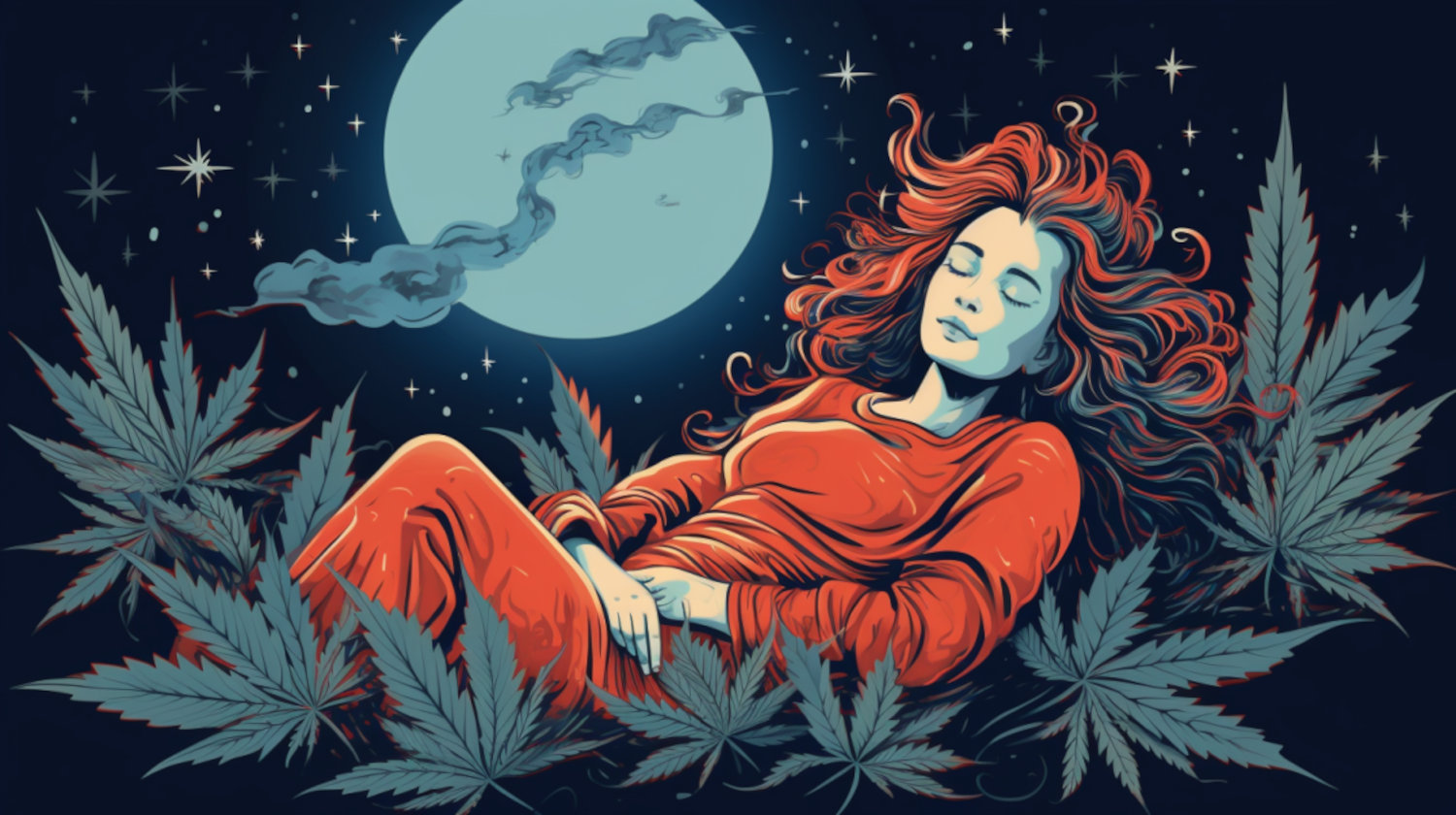Ambien is a prescription drug used to treat various sleep disorders. Sleep issues are prevalent among U.S. adults. According to the American Academy of Sleep Medicine, 30% to 35% of adults experience brief insomnia symptoms. Between 15% and 30% have short-term insomnia disorder, lasting up to three months. And at least 10% suffer from long-term insomnia, or chronic insomnia disorder.
According to a 2020 survey, 8.4% of adults reported taking sleep medications for their symptoms in the 30 days preceding the survey. And Ambien is among the most commonly prescribed sleep medications.
Cannabis is also frequently used by consumers as a sleep aid. Certain strains and cannabis products are even marketed to help with sleep. It shouldn’t come as a surprise, then, that many people who are struggling to fall or stay asleep at night are wondering if they can use Ambien and cannabis together to enhance a restful night’s sleep.
Neither cannabis nor Ambien is without its risks, and combining them has the potential for severe side effects. If you’re having difficulty sleeping, it’s important to understand the effects of both of these medications. There are factors to consider when taking them on their own, as well as potential risks that consumers should be aware of before considering using them together.
What Is Ambien?
Ambien is a prescription drug commonly used to treat sleep problems–mainly insomnia. Ambien is the brand name for zolpidem, which belongs to a class of drugs known as nonbenzodiazepines. Nonbenzodiazepines work very similarly to benzodiazepines, like Xanax–even binding to the same sites in the brain–but their chemical structure is different, so they’re classified differently.
Like benzodiazepines, zolpidem increases signals from GABA1, a neurotransmitter that sends calming messages within the brain. The brain uses GABA to inhibit excited nerves, leading to sedative effects. Unlike benzodiazepines, Ambien doesn’t bind to all benzodiazepine receptors in the brain, instead only to the BZ1 receptors. This is why researchers believe it doesn’t trigger the full range of effects that benzodiazepines carry.
Ambien isn’t the only brand name that zolpidem goes by. Other common brand names for zolpidem include:
- Ambien CR
- Edluar
- Intermezzo
- Zolpimist
Ambien is only approved to treat insomnia in the short term. It is specifically targeted at people who have a hard time falling asleep.
Possible Side Effects of Ambien

Ambien works within the body in a nearly identical way to benzodiazepines and, therefore, has nearly all the same risks and side effects. This includes a high risk for dependence and overdose.
Ambien doesn’t just help people fall asleep. It helps to keep them asleep for a full 8 hours. Because of this, it’s only recommended that people take Ambien if they plan on getting a full 8 hours of sleep. Waking up earlier will likely result in tiredness, grogginess, and an inability to focus.
The more common side effects associated with Ambien include:
- Drowsiness and feelings of being tired throughout the day
- Headaches
- Dizziness
- Lightheadedness
- Feelings of being ‘high’ or drugged
- Weakness or unsteadiness when walking
- Balance problems
- Nausea
- Constipation
- Diarrhea
- Gas
- Heartburn
- Abdominal or stomach pain
- Appetite changes
- Uncontrollable shaking in one or more body parts
- Burning, pain, numbness, or tingling in the extremities
- Strange dreams
- Burning, tingling, or redness of the tongue
- Dry mouth
- Pain or itching in the ears
- Ringing in the ears
- Redness in the eyes
- Cramps and muscle aches
- Back, joint, or neck pain
- Heavy menstrual bleeding
Side effects of Ambien which are more severe or may indicate a more severe underlying problem include:
- Itching
- Rash
- Hives
- Swelling in the eyes, tongue, throat, or lips
- Feeling like the throat is closing up
- Difficulty swallowing or breathing
- Hoarseness
- Shortness of breath
- Yellowing of the eyes or skin
- Unusually light-colored stool
- Nausea
- Vomiting
- Racing or pounding heartbeat
- Chest pain
- Vision problems
The two most serious risks associated with Ambien are overdose and dependency. Like benzodiazepines, Ambien carries a high risk for addiction. This is why Ambien is only recommended as a short-term treatment for insomnia. Ambien withdrawal can be severe and cause severe symptoms, like:
- Uncontrollable shakes
- Lightheadedness
- Cramping, especially in the stomach or abdomen
- Nausea
- Vomiting
- Sweating
- Redness or flushing of the skin
- Sleepiness or tiredness
- Unexplained and uncontrollable crying
- Anxiety, nervousness, and panic attacks
- Difficulty sleeping
In rare cases, Ambien withdrawal can cause seizures.2
Combining Ambien and Cannabis: What the Latest Research Says

Research into the combined use of Ambien and cannabis is limited, but existing evidence points to potential risks. Both substances can cause drowsiness on their own. When used together, the sedative effects may increase in intensity and duration, potentially impairing alertness and coordination.
Cannabis may also affect how the body metabolizes medications like Ambien. Early findings suggest that certain cannabinoids, including THC and CBD, may inhibit the CYP3A4 enzyme responsible for breaking down Ambien. This could result in Ambien staying in the system longer than expected, potentially increasing its effects.
Due to these factors, the combination may lead to unpredictable or prolonged sedation. While some people may not notice significant changes, others could experience excessive drowsiness, delayed reaction times, or difficulty waking.
If you’re using Ambien or considering medical cannabis for sleep support, speak with your doctor. They can help determine if one option may be more appropriate than the other based on your health history, lifestyle, and treatment goals.
What Drugs Interact with Ambien?
Ambien is known to have numerous drug interactions beyond cannabis, many of which can be serious.
Alcohol is one of the most warned-against substances since it’s a central nervous system depressant that can cause similar combined effects to cannabis. Using alcohol and Ambien together is extremely dangerous and can have serious side effects, including altered breathing that can lead to more serious consequences.
Other drugs that can interact with Ambien include:
- Benzodiazepines, like Valium and Xanax
- Opioids, like oxycodone and hydrocodone
- Imipramine(Tofranil)
- Chlorpromazine
- Selective serotonin reuptake inhibitors (SSRI), like Zoloft and Prozac
- CYP3A4 inducers
- CYP3A4 inhibitors (including cannabis)
- Tricyclic Antidepressants (TCA)
- Sedative-hypnotic drugs, like Lunestra and Sonata
- Certain antihistamines, like Benadryl
- Trazodone
- Bupropion (Wellbutrin SR)
- Serotonin norepinephrine reuptake inhibitors (SNRI), like Cymbalta and Pristiq
- Atypical antipsychotics, like Abilify and Seroquel
- Gabapentin (Neuronin)
- Pregabalin (Lyrica)
If you’re taking any of these medications, speak to your doctor before taking Ambien.
References
1. Bouchette, Daniel, and Judy Quick. “Zolpidem.” Nih.gov, StatPearls Publishing, 2019, www.ncbi.nlm.nih.gov/books/NBK442008/.
2. Haji Seyed Javadi SA, Hajiali F, Nassiri Asl M. Zolpidem Dependency and Withdrawal Seizure: A Case Report Study. Iranian Red Crescent Medical Journal. 2014;16(11). doi:https://doi.org/10.5812/ircmj.19926
3. A 2016 study investigated the use of nabilone, a synthetic cannabinoid, both independently and in conjunction with zolpidem to alleviate the symptoms of cannabis withdrawal. The researchers found that nabilone on its own was beneficial, but when used with zolpidem, participants found greater relief.
4. Vandrey R, Smith MT, McCann UD, Budney AJ, Curran EM. Sleep disturbance and the effects of extended-release zolpidem during cannabis withdrawal. Drug and Alcohol Dependence. 2011;117(1):38-44. doi:https://doi.org/10.1016/j.drugalcdep.2011.01.003
The information in this article and any included images or charts are for educational purposes only. This information is neither a substitute for, nor does it replace, professional legal advice or medical advice, diagnosis, or treatment. If you have any concerns or questions about laws, regulations, or your health, you should always consult with an attorney, physician or other licensed professional.




